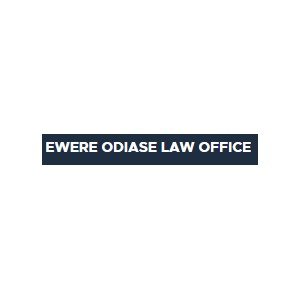Best Adoption Lawyers in Asaba
Share your needs with us, get contacted by law firms.
Free. Takes 2 min.
Free Guide to Hiring a Family Lawyer
List of the best lawyers in Asaba, Nigeria
Nigeria Adoption Legal Questions answered by Lawyers
Browse our 2 legal questions about Adoption in Nigeria and read the lawyer answers, or ask your own questions for free.
- Can I adopt a baby of 0 to 3 months old
- Can I adopt a baby within 0 to 3months old
-
Lawyer answer by CO-dunni Law Solicitors
Yes you can can , but it all depends on a lot of factors. Talk to a lawyer in your State.
Read full answer - Adoption process
- How can a couple adopt a child
-
Lawyer answer by CO-dunni Law Solicitors
You need to approach the ministry in charge of adoption. The State you reside would determine the Ministry to approach. You need to find a Family Lawyer near you for guidance. Talk to you soon.
Read full answer
About Adoption Law in Asaba, Nigeria:
Adoption in Asaba, Nigeria is a legal process by which an individual or a couple becomes the legal parent(s) of a child who is not their biological child. It is regulated by the Adoption Laws of Nigeria and other relevant regulations. The purpose of adoption is to provide a stable and nurturing environment for children who are unable to live with their biological parents.
Why You May Need a Lawyer:
Adopting a child can be a complex legal process, and it is highly recommended to seek the assistance of a lawyer specializing in adoption cases. A lawyer can provide guidance and ensure that you fulfill all the legal requirements, such as submitting necessary documentation, attending court hearings, and completing home study assessments. Additionally, a lawyer can protect your rights and interests throughout the adoption process.
Local Laws Overview:
Adoption laws in Asaba, Nigeria are primarily governed by the Child Rights Act, the National Adoption Guidelines, and the Adoption Laws of Nigeria. Some key aspects of local laws related to adoption include:
- The minimum age requirement for adopting parents
- The eligibility criteria for adopting parents
- Consent requirements from biological parents or guardians
- The necessity of a home study assessment
- The role of the State Adoption Committee
- The legal process for completing an adoption
Frequently Asked Questions:
1. Can single individuals adopt a child in Asaba, Nigeria?
Yes, single individuals are allowed to adopt a child in Asaba, Nigeria, as long as they meet the eligibility criteria set by the adoption laws.
2. What are the age requirements for adoptive parents?
Adoptive parents must be at least 25 years old and at least 21 years older than the child they wish to adopt. However, exceptions may be made based on the best interests of the child.
3. Do biological parents need to give consent for adoption?
Yes, the consent of the biological parents or legal guardians is generally required for adoption. However, in certain circumstances where the child is abandoned or the biological parents' rights have been terminated, consent may not be necessary.
4. How long does the adoption process take?
The adoption process duration can vary depending on various factors, including court proceedings, document processing, and the availability of suitable adoption opportunities. It is recommended to consult with a lawyer to understand the estimated timeframes based on your specific situation.
5. Can I adopt a child from Asaba if I am not a Nigerian citizen?
Adoption laws in Nigeria generally prioritize Nigerian citizens for adoption. However, in some exceptional cases, non-Nigerian citizens may be eligible to adopt a child in Asaba. It is advisable to seek legal advice to explore your options and understand the specific requirements.
Additional Resources:
For further information and assistance regarding adoption in Asaba, Nigeria, consider reaching out to the following resources:
- Ministry of Women Affairs and Social Development - Asaba, Nigeria
- National Agency for the Prohibition of Trafficking in Persons (NAPTIP)
- Non-Governmental Organizations (NGOs) specializing in child welfare and adoption
Next Steps:
If you require legal assistance with adoption in Asaba, Nigeria, it is recommended to:
- Research and compile all relevant documents related to your adoption process
- Consult with a lawyer experienced in adoption cases to discuss your specific situation
- Provide all necessary information and documentation to the lawyer
- Follow your lawyer's guidance throughout the adoption process
- Maintain open communication with your lawyer and keep them informed of any updates or developments
Lawzana helps you find the best lawyers and law firms in Asaba through a curated and pre-screened list of qualified legal professionals. Our platform offers rankings and detailed profiles of attorneys and law firms, allowing you to compare based on practice areas, including Adoption, experience, and client feedback.
Each profile includes a description of the firm's areas of practice, client reviews, team members and partners, year of establishment, spoken languages, office locations, contact information, social media presence, and any published articles or resources. Most firms on our platform speak English and are experienced in both local and international legal matters.
Get a quote from top-rated law firms in Asaba, Nigeria — quickly, securely, and without unnecessary hassle.
Disclaimer:
The information provided on this page is for general informational purposes only and does not constitute legal advice. While we strive to ensure the accuracy and relevance of the content, legal information may change over time, and interpretations of the law can vary. You should always consult with a qualified legal professional for advice specific to your situation.
We disclaim all liability for actions taken or not taken based on the content of this page. If you believe any information is incorrect or outdated, please contact us, and we will review and update it where appropriate.










